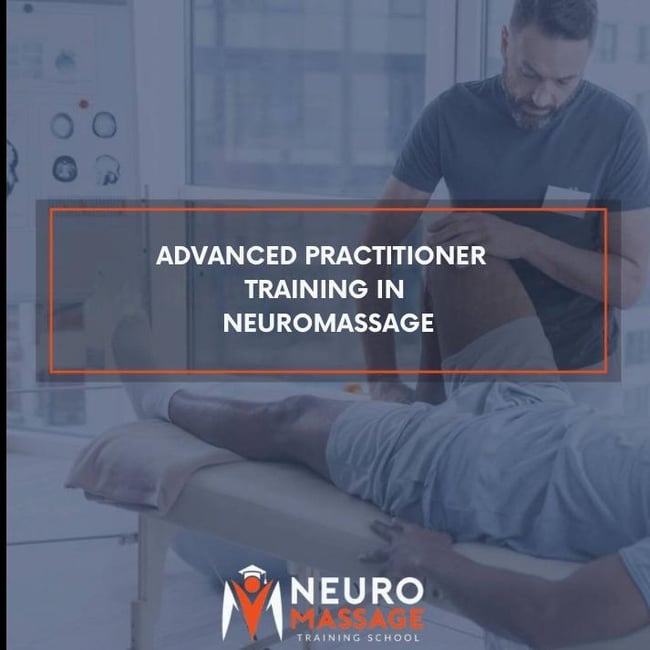Advanced Practitioner Training in NeuroMassage
Equipping massage therapists to lead with confidence in inclusive, neuro-aware massage.

Description
Become a specialist in inclusive, neuro-aware massage therapy for complex and neurological care.
This in-depth, CPD-certified training is designed for qualified massage therapists who are ready to expand their clinical knowledge, deepen their understanding of complex care, and lead with confidence in the growing field of neurological and disability-informed practice.
Through a structured, multi-module curriculum, this course equips you with the insight, skill, and clinical reasoning needed to work safely, compassionately, and effectively with clients affected by neurological conditions, complex disabilities, and long-term rehabilitation needs.
What You’ll Learn
This course builds on foundational massage skills and introduces advanced, specialist knowledge in inclusive neurological care.
Condition-Specific NeuroMassage Modules
Gain detailed understanding of symptoms, care needs, and massage adaptations for:
Cerebral Palsy
Motor Neurone Disease (MND)
Multiple Sclerosis (MS)
Parkinson’s Disease
Stroke (Post-Stroke Recovery)
Spinal Cord Injuries (SCI)
Transverse Myelitis
Brain Injuries (Acquired and Traumatic)
Each module includes relevant neuroanatomy, contraindications, positioning strategies, client welfare considerations, and scope-aware massage adaptations.
Additional Key Topics Covered
Neuroanatomy & Dermatomes Recap – Understand the nervous system pathways most relevant to your massage practice.
Contraindications & Clinical Risk Awareness – Learn when massage may be unsafe and how to adapt confidently within scope.
Working with Non-Verbal Clients, Aids, and Assistive Devices – Build confidence supporting diverse access needs.
Supporting Clients with Fatigue, Spasticity, Tremors, and Sensory Overload – Practical strategies for modifying your touch.
Trauma-Aware, Dignity-Centred Practice – Communicate safely, build trust, and honour the lived experience of complex care clients.
Multidisciplinary Working & Scope Clarity – Understand your professional role in rehab, support teams, and care systems.
Accessible Practice & Environment Design – Create inclusive booking systems, communication pathways, and physical environments.
Ethical Marketing & Messaging – Promote your services respectfully, legally, and with inclusive language for clients and carers.
Neuro Terminology Toolkit – Learn and apply commonly used neurological terms in a safe, non-clinical way to aid communication and confidence.
Professional Resources Included
To support your practice beyond the course, you’ll also receive:
Student Handbook – Study tips, navigation guide, and self-paced learning support.
Advanced Therapist Handbook – Practical strategies for adapting sessions, maintaining professional boundaries, and building clinical confidence.
Neuro-Terminology eBook – Accessible definitions and usage tips to help you feel fluent when working with clients, carers, or clinical teams.
Case Study Workbook – Templates and scenarios to support real-world reasoning.
Professional Notes & Treatment Planning Templates – Fully editable forms to use in your own client practice.
Learning Objectives
By the end of this course, learners will be able to:
Demonstrate an advanced understanding of neurological anatomy and dermatomes, and explain their relevance to massage adaptations for clients with neurological or complex care needs.
Identify the causes, types, and clinical presentations of a range of neurological conditions, including Cerebral Palsy, Motor Neurone Disease, Stroke, Parkinson’s Disease, Multiple Sclerosis, Brain Injury, Spinal Cord Injury, and Transverse Myelitis.
Recognise condition-specific contraindications, red flags, and scope boundaries, and adapt massage techniques appropriately to ensure client safety and practitioner professionalism.
Deliver inclusive, client-centred care that respects communication differences, mobility aids, assistive devices, sensory sensitivities, and emotional vulnerability.
Support skin integrity, manage postural risks, and adapt positioning strategies for clients with limited movement or high-pressure areas.
Communicate effectively with clients, carers, and allied health professionals, using appropriate terminology, inclusive language, and trauma-aware communication principles.
Apply clinical reasoning through real-life case studies, demonstrating confident decision-making in complex and variable client presentations.
Create accessible massage environments that meet the physical, sensory, and emotional needs of clients with neurological or long-term care conditions.
Operate ethically and professionally in a multidisciplinary context, understanding the therapist’s role within broader care or rehabilitation teams.
Market your services with clarity and responsibility, using inclusive, legally sound messaging that aligns with professional body and advertising standards.
Use resources such as client notes templates, professional handbooks, and terminology guides to support effective, organised, and legally compliant practice.
Reflect critically on your own practice and boundaries, with awareness of your scope, responsibilities, and opportunities for continued development.
Course Procedure
- Enroll in the course.
- View the course content.
- Take the test. (You must score 80% to pass. If you do not pass, you may retake the test.)
- Print your certificate of completion.
Course Content
| Module- 1: What is Neuro? | SCORM Package | ||
| Module- 2: Neuro terminology | SCORM Package | ||
| Module- 3: Contraindications and Considerations | SCORM Package | ||
| Module- 4: Patient Welfare | SCORM Package | ||
| Module- 5: Effective Communication Skills | SCORM Package | ||
| Module- 6: Understanding Cognition | SCORM Package | ||
| Module- 7.1: The Anatomy of Brain and Spinal Cord | SCORM Package | ||
| Module- 7.2: Dermatomes | Module | ||
| Module- 8.1: Spinal Cord Injury | SCORM Package | ||
| Module- 8.2: Stroke | SCORM Package | ||
| Module- 8.3: Neurodegenerative Diseases | SCORM Package | ||
| Module- 8.4: Brain injuries | SCORM Package | ||
| Module- 8.5: Cerebral Palsy | SCORM Package | ||
| Module- 8.6: Transverse Myelitis | SCORM Package | ||
| Module- 8.7: Other Conditions | SCORM Package | ||
| Module- 9: Presentations | SCORM Package | ||
| Module- 9.1: Quiz for Presentations | Module | ||
| Module- 10: Understanding Pain | SCORM Package | ||
| Module- 11: Skin Integrity | SCORM Package | ||
| Module- 12: Touch | SCORM Package | ||
| Module- 14: Selfcare as a Therapist | SCORM Package | ||
| Module- 15: Starting your business as a Neuro Therapist | SCORM Package | ||
| Video Library for Advanced Practitioner Training | Module |